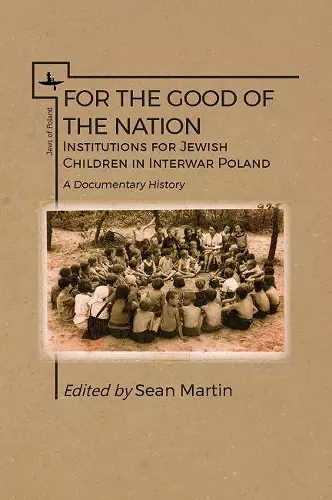For the Good of the Nation
Institutions for Jewish Children in Interwar Poland. A Documentary History
Format:Hardback
Publisher:Academic Studies Press
Published:30th Jul '17
Currently unavailable, and unfortunately no date known when it will be back

Tens of thousands of Jewish children were orphaned during World War I and in the subsequent years of conflict. In response, Jewish leaders in Poland established CENTOS, the Central Union of Associations for Jewish Orphan Care. Through CENTOS, social workers and other professionals cooperated to offer Jewish children the preparation necessary to survive during a turbulent period. They established new organizations that functioned beyond the authority of the recognized Jewish community and with the support of Polish officials. The work of CENTOS exemplifies the community’s goal to build a Jewish future. Translations of sources from CENTOS publications in Yiddish and Polish describe the lives of the orphaned Jewish children and the tireless efforts of adults to better the children’s circumstances.
“For the Good of the Nation should be an interesting book and source of references for researchers of interwar Polish-Jewish society, culture, social politics, and education. All readers will have a chance to discover in this volume something relevant to their research. It may serve also as an important inspiration for the next research undertaking.” —Kamil Kijek, Institute for Jewish Studies, University of Wrocław, Slavic Review, Vol. 77, No. 4 -- Kamil Kijek * Slavic Review *
“Although orphan care in Poland after World War I is often mentioned in Polish studies, Martin’s book is the first to cover this topic—and American assistance in particular—in such a thorough and detailed fashion. … Sean Martin collected material for his book in libraries and archives on three continents. Not every specialist on interwar Poland, Jewish history, Polish-Jewish-American relations, or history of social work—to whom this book would be of particular interest—has had such an opportunity. By publishing his documentary history, Martin has unlocked the libraries and archives for his colleagues. Documents sitting untouched on the shelves of archives or libraries, like books with uncut edges, remain silent. Martin has allowed them to speak. Moreover, by reconstructing the tragic history, he, either explicitly or implicitly, holds us accountable to children for all the wars that we have waged and, sadly, continue to wage.” —Olga Medvedeva-Nathoo, The Polish Review
* The Polish Review *ISBN: 9781618115676
Dimensions: unknown
Weight: unknown
242 pages